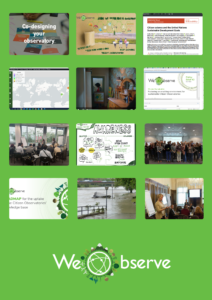After 40 months of intensive coordination and research, the WeObserve project, an H2020 coordination and support action on the subject of Citizen Observatories, was successfully completed in March 2021. Now, it’s time to celebrate, share some great outcomes and thank everyone who was involved in making it possible.
WeObserve’s mission was to bring Citizen Observatories (COs) together to advance citizen science and demonstrate COs as a valuable component in managing environmental issues and empowering resilient communities. To do so, WeObserve targeted, connected and coordinated relevant stakeholders and improved coordination between existing environmental COs and relevant activities at regional, European and international levels through Communities of Practice (CoPs), WeObserve events and conferences and other coordination activities, such as the WeObserve MOOC, Toolkit, Cookbook, Roadshows on COs for flood risk management, hackathons, or an Open Data Challenge.
We also actively forged links with GEOSS, Copernicus and the UN SDG framework. Overall, the project had high public visibility presenting activities, insights and results at more than 40 events, conferences, webinars and other high-level fora.
With our activities, WeObserve greatly expanded the geographical coverage and use of environmental COs reaching participants and practitioners in more than 100 countries globally. The expanded use of outputs was further supported via a range of key publications and outputs (14 journal publications, 25+ policy documents, conference papers and posters, technical and other reports). Activities from the Interop-CoP and OGC Citizen Science Domain Working Group supported the wider dissemination and uptake of data management and preservation strategies, for example by the Earth Challenge 2020. To increase opportunities for SMEs and businesses, WeObserve organised activities and an online marketplace that involved more than 80 SMEs in the INSPIRE Hackathon, the Open Data Challenge, Copernicus pilot, the WeObserve Roadshows, CO4EO workshops and webinars.
Furthermore, WeObserve strengthened the leading role for Europe in the integration and uptake of citizen science in GEOSS and implementing the SDGs. The EuroGEO 2019 Citizen Science roadmap “The Lisbon Declaration” outlines the European contribution of citizen science and COs in GEOSS. The SDGs-CoP supported key activities in the field of citizen science and produced seminal publications on citizen science and the SDGs. Results of these were presented during the UN-SPBF 2021 and included in the official forum summary report, which informed UNEA-5, the world’s highest level decision-making body on the environment. The same results now underpin a pilot project in Ghana using citizen science for SDG monitoring and SDG-CoP members contributed to the SDG marine litter indicator (14.1.1b) methodology, which recommends citizen science as a primary data source for marine litter monitoring.
With all these activities, WeObserve demonstrated the great value of Coordination and Support Action projects for the consolidation of knowledge and insights as well as exploitation and amplification of H2020 Innovation Actions (IA) and Research and Innovation Actions (RIA). We managed to reach and engage a considerable range of communities, end-users, participants and contributors with the topic of Citizen Observatories through targeted high-quality activities. The different acts of network building within WeObserve have enabled several follow-up and expansion activities with anticipated, long-lasting benefits for the mainstreaming of citizen science.
We as coordinators thank everyone involved in the project, from engaged participant to consortium partner, for making this project a success!

